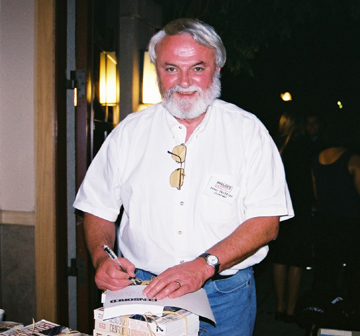David Phinney thought he’d struck journalistic gold. The veteran reporter, who has done freelance work for PBS, ABC, The New York Times, and other news companies, learned from a disgusted American contractor that the Kuwaiti company hired to build the U.S. embassy in Iraq was using forced laborers trafficked in from Asia.
 He pitched the story to several news organizations and then waited months to hear back from them. Only NBC responded, but the network was only interested in his sources — so they could produce their own version of the story. “I tried to sell it to every major news organization that I could think of,” said Phinney. “They all thought that it was fascinating, but they didn’t want to pay for my story, they just wanted to rip off my sources.” Al Jazeera, the preeminent television news company in the Middle East, based in Qatar, was the only major news outlet to take an interest in Phinney’s work. The story eventually ran on CorpWatch, a politically neutral internet watchdog site. The story triggered a congressional hearing and a labor trafficking investigation by the U.S. Justice Department, but despite that, Phinney believes the public is still largely unaware of the issue. “I was sitting with an old [Associated Press] reporter who said, ‘This is old news.’ I said, ‘I never saw you report it.’ He said ‘Well, it’s all over the web.’ “
He pitched the story to several news organizations and then waited months to hear back from them. Only NBC responded, but the network was only interested in his sources — so they could produce their own version of the story. “I tried to sell it to every major news organization that I could think of,” said Phinney. “They all thought that it was fascinating, but they didn’t want to pay for my story, they just wanted to rip off my sources.” Al Jazeera, the preeminent television news company in the Middle East, based in Qatar, was the only major news outlet to take an interest in Phinney’s work. The story eventually ran on CorpWatch, a politically neutral internet watchdog site. The story triggered a congressional hearing and a labor trafficking investigation by the U.S. Justice Department, but despite that, Phinney believes the public is still largely unaware of the issue. “I was sitting with an old [Associated Press] reporter who said, ‘This is old news.’ I said, ‘I never saw you report it.’ He said ‘Well, it’s all over the web.’ “
So Phinney was not surprised when he found his story on the 2007 Project Censored list — in company with a score of other stories that, despite their potential major impact, received minimal coverage by major news organizations in the past year. For the past 31 years, Project Censored, based at Sonoma State University in Rohnert Park, Calif., has selected what the research group believes to be the most important news stories that flew under the national radar each year — either under-reported or completely ignored by the mainstream media. The group is composed of more than 200 Sonoma State faculty members, students, and experts, who refer hundreds of stories to a panel of judges, which then ranks them in order of importance.
The 2007 report, released earlier this month, revealed what may be the scariest list in recent memory. Phinney’s article about the use of slave labor to build an American embassy, shocking as it may be, ranked fifth on the list of 25. The No. 1 story: hidden language in the Military Commissions Act of 2006 that does away with habeas corpus rights, one of the most elemental principles of our legal system, for anyone labeled an “enemy of the state,” — including, potentially, U.S. citizens.
The same day that bill was signed, President Bush also set into motion the basis for the No. 2 censored story: He signed the John Warner Defense Authorization Act, which gives the president the power to station troops anywhere in this country and take control of state-based National Guard units, without the consent of local authorities. U.S. Sen. Patrick Leahy, a Vermont Democrat, was quoted as predicting that the act will actually encourage the president to declare federal martial law
 Also included on the list are stories about a U.S. military command center in Africa that activists in the Niger region believe is actually designed to retain control of Africa’s oil reserves for the West; another about Blackwater, generally recognized as the most powerful mercenary firm in the world, which has received far and away more coverage than any other story on the list; and an article about financial companies using what are known as vulture funds to undermine global efforts to relieve developing nations of their crushing debt load. The 2007 report is particularly worrisome for those who’ve watched the inroads being made by the Bush administration into basic constitutional protections. “The civil liberties aspect of this year’s list is personally troubling for many people,” Project Censored director Peter Phillips told Fort Worth Weekly. Some of the articles cover issues so weighty that many observers wonder how they could have slipped through the cracks.
Also included on the list are stories about a U.S. military command center in Africa that activists in the Niger region believe is actually designed to retain control of Africa’s oil reserves for the West; another about Blackwater, generally recognized as the most powerful mercenary firm in the world, which has received far and away more coverage than any other story on the list; and an article about financial companies using what are known as vulture funds to undermine global efforts to relieve developing nations of their crushing debt load. The 2007 report is particularly worrisome for those who’ve watched the inroads being made by the Bush administration into basic constitutional protections. “The civil liberties aspect of this year’s list is personally troubling for many people,” Project Censored director Peter Phillips told Fort Worth Weekly. Some of the articles cover issues so weighty that many observers wonder how they could have slipped through the cracks.
Phillips and others believe that corporate media giants miss so many important stories because they are concerning themselves more and more with the entertainment value and the profitability of their news. Many of the pieces on the 2007 list were covered by large news outlets but often only in the back pages of a newspaper or reduced to a few seconds of afterthought on the 24-hour cable news networks. While the sexier stories are grabbing the headlines, some of the most important ones are being slighted or missed altogether. For example, while the mainstream news media was dedicating wells of ink to Don Imus’ inappropriate comments about the Rutgers girls’ basketball team, Oxfam, a British-based confederation of 13 humanitarian organizations, was reporting on exploitative trade agreements that the U.S and other rich countries are pursuing with developing countries, outside the control of the World Trade Organization — a story that was covered in several news outlets, but not as thoroughly as in the Oxfam piece.
In some cases, the news media have actually worked to help conceal key aspects of major stories. SourceWatch, a generally respected online news organization, published articles on Operation FALCON, a national dragnet that led to the arrest of more than 30,000 of what the U.S. Department of Justice called “the worst of the worst” fugitives in this country, with an emphasis on sex offenders. The mainstream media, including the Times and Washington Post, reported the action, the brainchild of then-Atty. Gen. Alberto Gonzales, but never bothered to ask what the criminals had done to deserve a part in such a dramatic and unprecedented roundup. In fact, fewer than 10 percent of those arrested were sex offenders. According to research by Project Censored, no major daily newspaper or network news program has done any follow-up coverage to determine who the 30,000 people arrested were or what has happened to them.
Or take the habeas corpus story. Robert Parry, an editor and writer for www.consortiumnews.com, an independent investigative journalism site, wrote about how the Military Commissions Act strips American citizens of their right to a fair trial. The Times covered the story incorrectly, stating that the law doesn’t apply to American citizens. And many major national papers missed the story altogether. Parry, a highly respected journalist who is credited with breaking the Iran Contra scandal and who has written for the Associated Press, the Times, and other news organizations, contends the reason the story didn’t get much attention is that journalists didn’t do a thorough job of reporting. “The problem is that journalists, much like members of Congress, don’t always read the bills,” said Parry, whose article is the top story on the list. “When you’re passing laws, especially ones that deal with the civil liberties of Americans, people should look at it much more carefully. It probably should have gotten more attention from both members of Congress and the news media, but we did the best we could.”
 It has been well-reported over the past several years that the news industry has been undergoing dramatic changes affecting the ability of major newspapers and networks alike to provide the same quality and quantity of coverage as in the past. The internet is becoming the main news source for more and more people, supplanting television news, which in turn had encroached on the print media’s dominance. For those who go looking for it, news is more accessible — and more confusing — than ever. But Phillips, a sociology professor who has directed Project Censored for 11 years, said that consolidation in the mainstream media is actually reducing the variety of stories that most people see — so much so, he said, that most major sources run pretty much the same stories, with much of their content provided by the same wire services. “Eighty-five percent of the public gets their news from the corporate media,” he said. “I read stories in The New York Times every day where there is always something that is left out or is overplayed, and the headline doesn’t match the content. … Pressure needs be put on them to tell the stories that impact people’s lives.”
It has been well-reported over the past several years that the news industry has been undergoing dramatic changes affecting the ability of major newspapers and networks alike to provide the same quality and quantity of coverage as in the past. The internet is becoming the main news source for more and more people, supplanting television news, which in turn had encroached on the print media’s dominance. For those who go looking for it, news is more accessible — and more confusing — than ever. But Phillips, a sociology professor who has directed Project Censored for 11 years, said that consolidation in the mainstream media is actually reducing the variety of stories that most people see — so much so, he said, that most major sources run pretty much the same stories, with much of their content provided by the same wire services. “Eighty-five percent of the public gets their news from the corporate media,” he said. “I read stories in The New York Times every day where there is always something that is left out or is overplayed, and the headline doesn’t match the content. … Pressure needs be put on them to tell the stories that impact people’s lives.”
He and other observers are also alarmed at how public relations firms have affected the way people get news. Groups such as Omnicom, WPP, and the Interpublic Group package news stories for the media, making it easier for the local news media to choose stories, and further reducing the variety of articles most people see. Meanwhile, the White House and the Pentagon spent $1.6 billion on public relations and advertising in an 18-month period in 2004-2005. The result of the PR surge is that the corporate media are running more prepackaged news with less news analysis. Stories critical of rich and powerful businessmen and politicians, Phillips said, get ignored by the PR machines. Parry charged that the mainstream press has been reluctant to take on the Bush administration, for fear of the “L word.” During the Clinton years, Parry said, the press tried to shake its liberal reputation by meticulously scrutinizing the White House. The opposite effect happened when Bush came into the office, he said — the press buried its collective head in the sand, and after 9/11 it got worse.
Many of the pieces on the Project Censored list address policy change made after the World Trade Center attacks, when personal freedoms got trampled under the banner of national security. Parry and Phillips agree that the current administration is enacting laws that will make martial law a possibility if another attack on the scale of 9/11 occurs — and that the press is letting the administration get away with it by failing to cover the issue. Another striking aspect of the list is the prominence of blogs and internet-based news outfits, such as CorpWatch and www.consortiumnews.com, as publishers of what coverage there was of these stories. Many internet “news” sites continue to have credibility problems, but the 2007 Censored list reinforces the importance of those online news outlets while simultaneously highlighting the limitations of traditional media companies.
Kelly McBride, ethics group leader for the Poynter Institute, a major journalism education center, said the internet has provided a venue for people who otherwise wouldn’t have been able to pursue information on the issues they care about.
“One of the things that you see with information on the internet is that it’s given a voice to activists who have traditionally struggled to get their voices heard,” she said. “It amplifies the voice of people who, in the past, because the mainstream media were the gatekeepers of information, were [drowned out].” The problem for news consumers is evaluating what they find on the web. Many online news sources do not adhere to the strict standards of traditional journalists — which means that some legitimate stories, such as that of U.S. Sen. Larry Craig soliciting sex in an airport bathroom, get reported on the blogosphere first because web sites run the story without the level of verification that most media outlets require. It also means that many stories that turn out not to be true also get reported — and never verified — on the web.
 The internet revolution has caused the news media to change the way they report and deliver news. Many newspapers and local TV news programs have concentrated their efforts on local stories because that’s a commodity that readers and viewers can’t easily find from other sources. And while the bigger national and international stories still get ink and air time, many newspapers, including the corporate owners of the Fort Worth Star-Telegram and The Dallas Morning News, have closed foreign bureaus and are relying more on wire services for stories outside of their region. Part of the fallout of concentrating on local news, according to McBride, is that stories such as those on the Project Censored list never see the light of day in the local daily papers. “I think almost every one of those [stories] has been in either The New York Times or Washington Post in some form or another,” she said. “Every one of those stories has a national or international [angle], and you’re seeing news organizations scale back their coverage of national and international news stories in favor of local news. You have to develop a niche in today’s market and dominate that niche if you want to sell to advertisers.”
The internet revolution has caused the news media to change the way they report and deliver news. Many newspapers and local TV news programs have concentrated their efforts on local stories because that’s a commodity that readers and viewers can’t easily find from other sources. And while the bigger national and international stories still get ink and air time, many newspapers, including the corporate owners of the Fort Worth Star-Telegram and The Dallas Morning News, have closed foreign bureaus and are relying more on wire services for stories outside of their region. Part of the fallout of concentrating on local news, according to McBride, is that stories such as those on the Project Censored list never see the light of day in the local daily papers. “I think almost every one of those [stories] has been in either The New York Times or Washington Post in some form or another,” she said. “Every one of those stories has a national or international [angle], and you’re seeing news organizations scale back their coverage of national and international news stories in favor of local news. You have to develop a niche in today’s market and dominate that niche if you want to sell to advertisers.”
Philips said that ignoring stories and failing to hold the government fully accountable for its actions amounts to censorship. In his mind, the corporate media has ushered in an era of the lowest common denominator in terms of news coverage. He believes a broader definition of censorship is necessary. “The media is very sensitive about the word ‘censored,’ ” he said. “We need to redefine what we mean by the word” to mean “any interference with the free flow of information in a democratic society. … If that is the gold standard … you’re really talking about changing how corporate media operates in the U.S.” The flip side of that, he said, would be to encourage the development of more independent news outlets, including tax-supported media.
For journalists like Parry and Phinney, an appearance on Project Censored’s list is bittersweet. On the one hand, they are being recognized for outstanding work; on the other hand, that work didn’t get the attention it deserved. “I have an ambivalent view about being recognized for being censored. It seems kind of defeatist to me,” said Parry. “I understand what they are doing, and I appreciate it, but I think journalists should try to get their stories to the public through more normal channels. It’s a bit like celebrating a defeat.”
Project Censored’s 2007 list:
1. No Habeas Corpus for “Any Person”
The Military Commissions Act of 2006 ushered in military commission law for U.S. citizens and non-citizens alike. It allows for the institution of a military alternative to the civilian justice system for “any person” arbitrarily deemed to be an enemy of the state.
One section of the act is specifically directed at American citizens: “Any person subject to this chapter who, in breach of an allegiance or duty to the United States, knowingly and intentionally aids an enemy of the United States, or one of the co-belligerents of the enemy, shall be punished as a military commissioner under this chapter may direct.”
As Parry pointed out, American citizens are the ones most likely to have an allegiance or duty to the United States.
— Robert Parry, Consortium, Oct. 19, 2006.
2. Bush Moves Toward Martial Law
The John Warner Defense Authorization Act of 2007 allows the president to deploy military troops anywhere in the United States and take control of state-based National Guard units without the consent of the governor or local authorities in order to “suppress public disorder … as a result of a natural disaster, epidemic, … terrorist attack or incident.”
This law essentially nullifies the Posse Comitatus Act, signed into law in 1878, which restricts military involvement in domestic enforcement. The new law also grants the military the right to round up protesters, illegal aliens, and “potential” terrorists and grants the Pentagon $532.8 billion to implement it.
— Frank Morales, Oct. 26, 2006, in Toward Freedom, a self-described progressive internet site that features news stories and editorials.
3. AFRICOM: U.S. Military Control of Africa’s Resources
In February 2007 the White House announced the formation of the US African Command (AFRICOM), a unified Pentagon command center in Africa. Presented as a humanitarian guard in the global war on terror, the real objective, according to Sen. Leahy and other critics, is procurement and control of Africa’s oil and its global delivery systems. Activists in the Niger Delta region have been clamoring for self-determination and an equitable share of oil profits for decades, and their tactics have shifted from petition drives to attacks on pipelines. AFRICOM’s ostensible goal is to “stabilize” the region, thereby ending local resistance.
— Bryan Hunt, Feb. 21, 2007, in www.MoonofAlabama.org, a political, economic, and philosophical discussion site that features news articles and blogs.
4. Increasingly Destructive Trade Agreements
The U.S. and European Union are vigorously pursuing trade and investment agreements outside the auspices of the World Trade Organization, agreements that Oxfam officials believe are increasingly exploitative toward developing countries and will result in unprecedented loss of livelihood, displacement of population, and degradation of human rights and environments. The U.S. and E.U. are demanding unprecedented tariff reductions in these agreements, to allow them to dump subsidized agricultural goods from their economies on underdeveloped countries, plunging local farmers into poverty.
—Sanjay Suri, March 2, 2007, for the Inter Press Service News Agency, an independent news agency primarily focused on global issues.
5. Enslaved Workers Building U.S. Embassy in Iraq
The enduring monument to U.S. liberation and democracy in Iraq is being built by forced labor, according to interviews and documents obtained by reporter David Phinney. Contractors working for the U.S. State Department are using bait-and-switch recruiting practices to smuggle Asian workers into brutal and inhumane labor camps in the middle of Beirut’s U.S.-controlled Green Zone.
First Kuwait Trading and Contracting is one of many contractors that have benefited from the U.S.-led invasion of Iraq. The company had employed about 7,500 foreign laborers, 3,000 of whom are from South Asia. One of that company’s practices is to force foreign laborers to surrender their passports to company officials until the work is completed.
— Phinney, CorpWatch, Oct. 17, 2006.
6. Operation FALCON Raids
Under Operation FALCON — for “Federal and Local Cops Organized Nationally” — more than 30,000 “fugitives” were arrested in one of the largest dragnets in the nation’s history, between April 2005 and October 2006. More than 960 state, local and federal agencies were directly involved in the effort to round up the “worst of the worst” fugitives, with an emphasis on sex offenders.
There was plenty of local news coverage on the raids themselves, but few if any reports on who the fugitives were and what became of them.
— Brenda J. Elliot, Sourcewatch, Nov. 18, 2006.
7. Behind Blackwater Inc.
Blackwater, the most powerful mercenary firm in the world, embodies the privatization of the military-industrial complex. Bush’s contracts with Blackwater have allowed the creation of a private army of more than 20,000 soldiers, operating with almost no oversight or effective legal constraints, to deploy in nine countries, mostly on behalf of the U.S. government, and to aggressively expand its presence inside U.S. borders.
More recently, Blackwater has been back in the news after one of its convoys was accused of killing Iraqi civilians, and the Iraqi government requested that the company be tossed out of the country. So far, the U.S. government hasn’t agreed to that, but did significantly reduce the firm’s security role.
— Jeremy Scahill, Jan. 26, 2007, in Democracy Now!, an award-winning independent radio news program airing on more than 450 stations in North America and with a strong online presence.
8. KIA: The U.S. Economic Invasion of India
The Knowledge Initiative in Agriculture, quietly signed by Bush and Indian Prime Minister Manmohan Singh, trades local control of India’s agricultural sector for U.S. nuclear technology. The United States agreed to send nuclear fuel shipments for civilian use, allowing India’s existing nuclear fuel to be used for military purposes. In return, the Indian government has resurrected an old colonial law to allow it to grab privately owned land and give it to U.S companies, which are fast putting Indian companies and farmers out of business.
The KIA is allowing St. Louis-based Monsanto to move in on India’s agricultural sector, while opening the door for India’s trade sector to be dominated by agribusiness giants ADM and Cargill and opening its retail sector to takeover by Wal-Mart.
According to Democracy Now!, as many as 28,000 Indian farmers have committed suicide over the last decade as a result of debt incurred from failed genetically mutated crops and over-competition with the subsidized crops of American corporations.
— Vandana Shiva with Amy Goodman, Democracy Now!, Dec, 13, 2006.
9. Privatization of America’s Infrastructure
More than 20 states have enacted legislation allowing public-private partnerships to build and run highways. Americans will soon be paying Wall Street investors, Australian bankers, and Spanish contractors for the privilege of driving on American roads.
Despite a relative lack of attention to this issue nationally, in Texas it has received extensive coverage, in large part because of the Trans-Texas Corridor, a project pushed by Gov. Rick Perry that would create a network of huge toll road corridors at a price of $184 billion, including $1.2 billion paid to Cintra-Zachry, a Spanish building company that stands to collect on the toll roads.
— Daniel Schulman with James Ridgeway. Mother Jones, Feb. 2, 2007
10. Vulture Funds Threaten Debt Relief for Poor Nations
“Vulture funds” is the term used for companies that buy up the debt of poor nations cheaply, when they are about to be written off, and then sue for the full value of the debt plus interest, which might be ten times what the countries received originally. Otherwise known as “distressed-debt investors,” these companies profit from plunging impoverished nations into crippling debt.
In 1999, Romania had agreed to reduce the debt owed to them by Zambia, a poor African country, from $40 million to $3 million. The deal was killed when the English company Donegal International convinced the Romanian government to sell the debt for $4 million. Donegal then sued Zambia for the full $40 million. English courts ruled that Zambia — where the average wage is $1 a day — has to pay at least $15 million.
— Greg Palast with Meirion Jones for BBC Newsnight, Feb. 14, 2007.
11. The Scam of “Reconstruction” in Afghanistan
Much of the U.S. tax money earmarked to rebuild Afghanistan actually ends up going no further than the pockets of wealthy U.S. corporations — 86 cents of every dollar, according to Action Aid, a watchdog organization. Paychecks for overpriced and often incompetent American “experts” under contract to USAID go directly from the agency to American bank accounts. Of the aid that does make it to the recipient country, 70 percent is “tied” to the donor nation — requiring that the recipient use the donated money to buy products and services from the donor country, often at drastically inflated prices
— Ann Jones, Aug. 27, 2006, in www.Tomdispatch.com, a project of the Nation Institute, a progressive-minded news organization.
 12. Another Massacre in Haiti by U.N. Troops
12. Another Massacre in Haiti by U.N. Troops
On Dec. 22, 2006, more than 30 unarmed Haitian civilians, including women and children, were killed by indiscriminate gunfire from United Nations “peacekeeping” forces, reportedly as collective punishment for a massive demonstration days earlier calling for the return of President Jean-Bertrand Aristide, who fled the country amid a rebellion.
Film footage recorded by the Haiti Information Project, a humanitarian organization, shows an unidentified man dying as he describes being shot from a circling U.N. helicopter. The group also has video of a teenaged boy shot by U.N. forces, who, before he dies, explains how the U.N. opened fire on unarmed civilians.
— Haiti Information Project, Haiti Action, Jan. 21, 2007
13. Immigrant Roundups to Gain Cheap Labor for U.S. Corporate Giants
In the wake of 9/11, U.S. Immigration and Customs Enforcement has conducted raids and roundups of undocumented immigrants under the rubric of preventing terrorism. The real goal, according to union activists and others, is to replace the current immigrant work force in this country with a tightly regulated, exploitive guest-worker program. This practice is endorsed by companies seeking low-wage workers through a lobby group called Essential Worker Immigration Coalition, whose 52 members include Wal-Mart, the U.S. Chamber of Commerce, Marriott, and Tyson Foods. The program has resulted in the roundup of 13,000 undocumented workers.
— Laura Carlsen, Foreign Policy in Focus, Feb. 23, 2007
14. Impunity for U.S. War Criminals
A last-minute adjustment to the Military Commission Act of 2006 redefined torture, removing the harshest definition of war crimes and exempting perpetrators from prosecution for such offenses dating back to November 1997. The source of this provision, however, is a mystery. The White House denies any involvement or knowledge regarding the insertion of that language.
— Jeff Stein, Congressional Quarterly, Nov. 22, 2006
15. Toxic Exposure Can Be Genetically Transmitted to Future Generations
Research suggests that behavior and environmental conditions may program sections of future generations’ DNA. New evidence about how genes interact with the environment suggests that many industrial chemicals may be more dangerous than previously thought. One researcher predicted a revolution in medicine: “You aren’t eating and exercising just for yourself, but for your lineage.”
— Peter Montague, Rachel’s Democracy & Health News, Oct. 12, 2006
16. No Hard Evidence Connecting Bin Laden to 9/11
Osama bin Ladin’s role in the events of 9/11 is not part of his profile on the FBI’s “Ten Most Wanted” list. Six years later an FBI spokesman explained, “The reason 9/11 is not mentioned on Osama bin Laden’s “Most Wanted” page is because the FBI has no hard evidence connecting bin Laden to 9/11 … .”
— Ed Haas, June 6, 2006, in Muckraker Report, an online independent watchdog site.
17. Drinking Water Contaminated by Military and Corporations
Corporations, cities, and the U.S. military are using America’s waters as their dumping ground — often with little or no accountability. The average major water purification facility discharges pollutants at nearly four times the legal limit, while more than 40 percent of American waterways are unsafe for swimming and fishing,
— Sunny Lewis, Environment News Service, March 24, 2006.
18. Mexico’s Stolen Election
U.S. interests were significantly invested in the outcome of Mexico’s 2006 presidential election in which overwhelming evidence revealed massive fraud by the eventual victor, according to the human rights organizations Civic Alliance and Global Exchange.
The Mexican government owns and controls that nation’s oil and gas industry via Petroleos Mexicanos (PEMEX), the fifth largest oil company in the world, which exports 80 percent of its oil to the United States. President Felipe Calderon has pushed to remove barriers to foreign investments, which would allow even more foreign control of that industry.
— Chuck Collins and Joshua Holland, AlterNet, Aug. 2, 2006.
19. People’s Movement Challenges American Economic Control
In Latin America, massive opposition to U.S. economic domination is building. Populist leaders and parties are taking control of some national governments, building powerful alternatives to the exploitation caused by the same laissez-faire attitudes that prevailed during the Great Depression.
— American Friends Service Committee, Trade Matters, May 3, 2006.
20. Terror Act Against Animal Activists
The Animal Enterprise Terrorism Act of 2006 expanded the definition of “terrorism” to include acts that interfere, or promote interference, with the operation of an animal enterprise. More than 160 groups opposed this act on grounds that its wording is dangerously vague and poses major conflicts to the U.S. Constitution. Under this law, First Amendment-protected activities such as demonstrations could be ruled illegal.
— David Hoch and Odette Wilkens, Vermont Journal of Environmental Law, March 9, 2007
21. U.S. Seeks Immunity for Illegal Farm Payments
The July 2006 World Trade Organization negotiations, held in Doha, Qatar, broke down over the contentious issue of farm trade and the unrestricted opening of markets to agricultural products. In a last-minute proposal, not included on the original agenda, the United States insisted that all trade agreements include a special “Peace Clause” that would make its use of illegal farm subsidies immune from prosecution.
— Eoin Callan, Financial Times, Jan. 9, 2007.
22. North “Invades” Mexico
The number of North Americans living in Mexico has soared from 200,000 to 1 million (one-quarter of all U.S. expatriates) in the past decade. With more than 70 million American baby-boomers expected to retire in the next two decades, experts predict a tidal wave of migration. The land rush is sending property values zooming, to the detriment of locals whose children are consequently driven into slums or forced to emigrate north.
— Mike Davis, www.TomDispatch.com, Sept. 19, 2006.
23. Feinstein’s Conflict of Interest in Iraq
U.S. Sen. Dianne Feinstein of California is involved in monumental conflicts of interest as she promotes and exploits the global war on terror. As a member of the Military Construction Appropriations subcommittee, she voted for spending billions of dollars with her husband’s military construction firms, while consistently voting to fund U.S. military proliferation.
— Peter Byrne, Jan. 24, 2007, in North Bay Bohemian, a newspaper in Santa Rosa, Calif.
24. News Reports Misquote Threat From Iran’s President
A mistranslated quotation attributed to Iran’s President Mahmoud Ahmadinejad, which threatened that, “Israel must be wiped off the map,” has been spread around the world. Ahmadinejad’s actual statements, however, were significantly less threatening. The Iranian president didn’t actually refer to Israel, but rather to the Israeli government. Iran’s foreign minister tried to clear up the statement, but the quote took on a life of its own.
— Arash Norouzi, Global Research, Jan. 20, 2007.
25. Who Will Profit From Native Energy?
The U.S. government and energy industry intend to shift this country away from dependence on foreign energy by deregulating and stepping up development of wind and solar resources on American Indian reservations — another form of exploitation of the tribes, according to the Indigenous Environmental Network, an environmental activist group.
— Brian Awehali, Lip Magazine, June 5, 2006.











